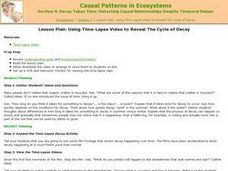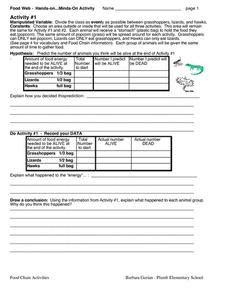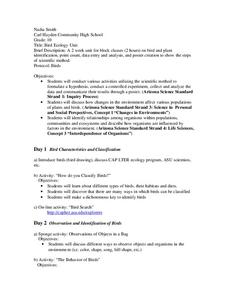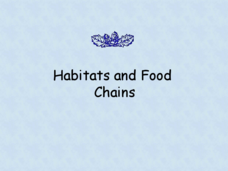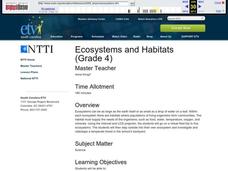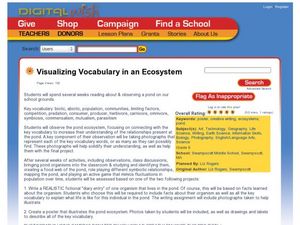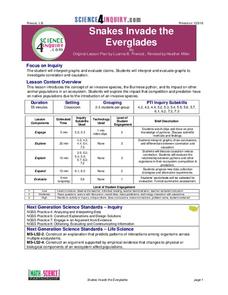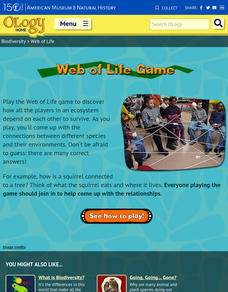Curated OER
GPS Ecosystem (Ecotone) Scavenger Hunt
Students describe the characteristics of an ecotone. In this ecotone lesson, students pick out their area and describe the visual appearance, conditions, ecosystem, biodiversity, predators, prey, and trees in their ecotone. They create a...
Curated OER
Regents High School Examination: Living Environment 2009
Emerging ecologists need a full understanding of life, from the inner workings of a cell to the complex relationships among organisms. This examination is meant to assess high schoolers after an entire year course on the living...
Curated OER
Casual Patterns in Ecosystems
Ecology explorers or beginning biologists view a time-lapse film of decaying strawberries. They discuss how decomposition occurs and what factors might affect the rate of decay. Alone, the lesson plan is lacking engaging attributes....
Curated OER
Food Chain Activities
Transform young biologists into grasshoppers, lizards, and hawks as you teach them about food chains in an interactive life science simulation. Working collaboratively to act out three different scenarios involving these creatures,...
Curated OER
Bird Ecology Unit
Tenth graders conduct various activities utilizing the scientific method to formulate a hypothesis, conduct a controlled experiment, collect and analyze the data and communicate their results through a poster. They also identify...
Curated OER
Speedy Succession
Fifth graders identify how a pond can change into a grassland. An ecosystems lesson where learners identify pioneer and climax species, and recognize that ecological succession can take up to 100 years or more. Some excellent activities...
Curated OER
That's Predictable - Stream Side Science
Research the impact that changes in biotic or abiotic factors might have on an ecosystem. Debate for or against the changes and take action in the community. This resource ideally follows stream studies that young ecologists may have...
Michigan State University
Bug Lyphe!
Introduce ecology classes to biodiversity and interdependence in ecosystems with a PowerPoint presentation. Then, they get up-close and personal with the invertebrate world by collecting insects, classifying them, and graphing their...
Curated OER
Habitats and Food Chains
Uncover the world of animal habitats, food chains, and the ecosystems with this well-put-together presentation. Each slide contains information and images that represent various aspects related to the ecosystem. Habitat, animal...
Curated OER
Telecollaboration Lesson
Sixth graders explore the Caribbean sea and the Arctic ocean. They become familiar with the living conditions of others. Students investigate the geographic location of each area. They become familiar with important events that helped...
Curated OER
Interactions of Living Things
Is it a producer, carnivore, omnivore, scavenger, or decomposer? Different relationships among organisms are explored here. It is a simple, multiple choice assignment. Use it as a quick warm-up or quiz.
NOAA
Deep-Sea Ecosystems – Entering the Twilight Zone
Imagine an ecosystem without any light or oxygen, where living things convert carbon dioxide into food. This ecosystem is thriving and might just be the largest ecosystem on our planet, yet we know very little about it. The lesson...
NOAA
Deep-Sea Ecosystems – Life is Weird!
A pool of brine in the deep sea can be up to four times as salty as the surrounding sea water. The deep sea ecosystem relies on chemosynthesis and the organisms that live there are often strange to us. The lesson focuses on researching...
Montana Natural History Center
Studying Grassland Ecosystems
At first glance, grassland ecosystems might seem dull and uninteresting, but once you start to explore it's amazing the things you'll find! Through this series of engaging lessons, activities, and experiments, elementary students examine...
Curated OER
Biomanipulation
Students explore the effects of aquatic trophic relationships on water transparency. They observe and explain the effects of reducing nutrient inputs on agal density on water transparency.
Curated OER
Two Way Causality in Ecosystems
Students complete various activities in order to explain that ecosystems are complex and that animal behavior (mainly that of a predator) is not necessarily intentional or bad.
Curated OER
Ecosystems and Habitats
Fourth graders go on a virtual field trip to five ecosystems. They investigate and videotape a temperate forest in the school's backyard.
Curated OER
Ecosystems II
Middle schoolers engage in a lesson that is about the concepts related to the careful balance of an ecosystem. They identify the beneficial and harmful relationships that can exist with diverse populations in an ecosystem. The lesson...
Curated OER
Visualizing Vocabulary in an Ecosystem
Sixth graders observe the pond ecosystem. In this ecosystem instructional activity, 6th graders observe the organisms at the pond and create a poster that illustrates the pond.
National Park Service
Living & Non-Living Interactions
What better way to learn about ecosystems than by getting outside and observing them first hand? Accompanying a field trip to a local park or outdoor space, this series of collaborative activities engages children in learning about the...
Howard Hughes Medical Institute
Lesson 4: Gorongosa's Food Webs
Who eats who in the savannas of Africa? Explore trophic levels with part four of an eight-part series of lessons focused around Gorongosa National Park. After young explorers identify animals using trailcam images, they construct a food...
Howard Hughes Medical Institute
Modeling Trophic Cascades
In the ecological game of who eats who, one small change can have a big impact! Individuals create food chains in an array of ecosystems, then determine what happens to organisms in the chain when one organism changes its feeding...
Science 4 Inquiry
Snakes in the Everglades
The Burmese python is on the loose ... and he's hungry! Illustrate the differences between causative and correlative relationships through an inquiry instructional activity. Pupils examine several sources of information to determine if...
American Museum of Natural History
Web of Life Game
Get caught in a web of learning. Classmates play a game to build a web to model the interaction of species that live in a specific ecosystem. They each assume the role of one species and work together, passing a ball of twine to indicate...




